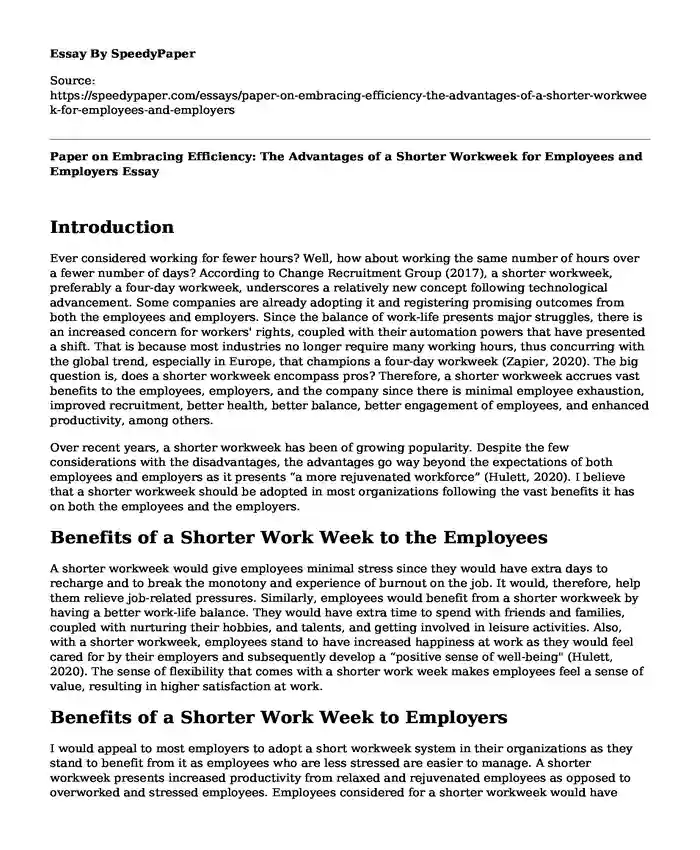
| Type of paper: | Essay |
| Categories: | Employment Job |
| Pages: | 3 |
| Wordcount: | 753 words |
Introduction
Ever considered working for fewer hours? Well, how about working the same number of hours over a fewer number of days? According to Change Recruitment Group (2017), a shorter workweek, preferably a four-day workweek, underscores a relatively new concept following technological advancement. Some companies are already adopting it and registering promising outcomes from both the employees and employers. Since the balance of work-life presents major struggles, there is an increased concern for workers' rights, coupled with their automation powers that have presented a shift. That is because most industries no longer require many working hours, thus concurring with the global trend, especially in Europe, that champions a four-day workweek (Zapier, 2020). The big question is, does a shorter workweek encompass pros? Therefore, a shorter workweek accrues vast benefits to the employees, employers, and the company since there is minimal employee exhaustion, improved recruitment, better health, better balance, better engagement of employees, and enhanced productivity, among others.
Over recent years, a shorter workweek has been of growing popularity. Despite the few considerations with the disadvantages, the advantages go way beyond the expectations of both employees and employers as it presents “a more rejuvenated workforce” (Hulett, 2020). I believe that a shorter workweek should be adopted in most organizations following the vast benefits it has on both the employees and the employers.
Benefits of a Shorter Work Week to the Employees
A shorter workweek would give employees minimal stress since they would have extra days to recharge and to break the monotony and experience of burnout on the job. It would, therefore, help them relieve job-related pressures. Similarly, employees would benefit from a shorter workweek by having a better work-life balance. They would have extra time to spend with friends and families, coupled with nurturing their hobbies, and talents, and getting involved in leisure activities. Also, with a shorter workweek, employees stand to have increased happiness at work as they would feel cared for by their employers and subsequently develop a “positive sense of well-being" (Hulett, 2020). The sense of flexibility that comes with a shorter work week makes employees feel a sense of value, resulting in higher satisfaction at work.
Benefits of a Shorter Work Week to Employers
I would appeal to most employers to adopt a short workweek system in their organizations as they stand to benefit from it as employees who are less stressed are easier to manage. A shorter workweek presents increased productivity from relaxed and rejuvenated employees as opposed to overworked and stressed employees. Employees considered for a shorter workweek would have improved job satisfaction, company loyalty, and practice teamwork, resulting in improved productivity. Additionally, there would be a reduction in costs with the adoption of a shorter workweek since employers would slash most bills like office maintenance fees and electricity (Hasan, 2020).
Moreover, there would be lower environmental degradation following the reduction in the carbon footprint of commuter pollution on machines and vehicles. Furthermore, with a shorter workweek, employers would never have to worry about employee absenteeism. When employees are given extra days for their time, it minimizes their likelihood of calling sick or taking rampant days off. Also, employees are more likely to start work as soon as they get to work instead of spending time on social media or first “chatting at the water cooler” (Monych, 2020).
Conclusion
Therefore, I would appeal to most employers to adopt the concept of a shorter work week considering the benefits it has not only on the employers but also on the workers and the companies as a whole. A shorter workweek would ensure improved, innovative, and better productivity, team building, cutting on costs, and employee satisfaction. Also, a shorter workweek comes with fewer overhead costs, lower environmental degradation, reduced stress, and better work-life balance. Therefore, a shorter workweek would ensure that employees remain more productive, focused, and creative since they would be more rejuvenated, happy, relaxed, stress-free, relieved of job-related pressures, and satisfied.
References
Change Recruitment Group. (2017). The pros and cons of a 4-day working week. Change. https://www.wework.com/ideas/growth-innovation/the-pros-and-cons-of-a-four-day-workweek
Hasan., S. (2020).8 Pros and cons of a four-day7 work week you wish you knew earlier. Tasque. https://blog.taskque.com/pros-cons-four-day-work-week/
Hulett, J. (2020). The pros and cons of a four-day workweek. We Work. https://www.wework.com/ideas/growth-innovation/the-pros-and-cons-of-a-four-day-workweek
Monych, B. (2020). Could a shorter work week boost employee productivity? Insperity. https://www.insperity.com/blog/shorter-work-week/
Zapier, M. (2020). These are the pros and cons of a four-day workweek. Fast Company. https://www.fastcompany.com/90263366/4-day-work-week-advantages-and-disadvantages
Cite this page
Paper on Embracing Efficiency: The Advantages of a Shorter Workweek for Employees and Employers. (2023, Nov 12). Retrieved from https://speedypaper.net/essays/paper-on-embracing-efficiency-the-advantages-of-a-shorter-workweek-for-employees-and-employers
Request Removal
If you are the original author of this essay and no longer wish to have it published on the SpeedyPaper website, please click below to request its removal:
- Essay Example about Correctional Officer Code of Ethics
- Essay Sample on the US-China Conflict Resolution
- Free Essay: Is Nursing a Vocation or Profession
- Essay Example for Students: American Economic Crisis
- Paper Example: Foreign-Policy Goal
- Speech of Tribute to Boss on the Retirement - Essay Example
- Paper Example. Summary of the Interview
Popular categories




